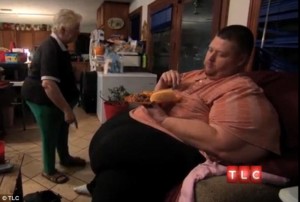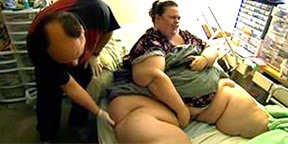
What is it with the spouses of bedridden super morbidly obese people who keep bringing them trays of food?
Being addicted to excessive amounts of eating is no excuse for bringing to the food addict, who weighs over 600 pounds and is bedridden, heaps and heaps of junky sugary items.
A study from the University of Georgia reveals that the behavior that drives a person to gorge abundantly on food is the same kind of impulsive behavior behind substance abuse. This is referred to as a compulsive personality.
But the difference between alcohol/drug addiction and that of food is that the former individual can easily ambulate to get the next fix.
A super morbidly obese person who’s confined to bed cannot do this.
Someone else supplies the food, prepares it, brings it to the bedside.
This is the enabler, and is almost always a spouse or significant other.
The journal Appetite (2014) has the University of Georgia report explaining that those with impulsive personalities are more apt to report greater levels of food addiction. This was associated with obesity.
“My lab generally studies alcohol, nicotine and other forms of drug addiction,” says James MacKillop in the paper, principal investigator of the study.
He continues, “…but we think it’s possible to think about impulsivity, food addiction and obesity using some of the same techniques.”
Have you ever noticed that those bedbound, super morbidly obese people on reality TV shows such as “My 600 Pound Life” and “Half-Ton Dad” never live alone?
That’s because it takes two people to create this horrendous situation: the food addict and the enabler. Sometimes there’s more than one enabler.
There’s growing research in the realm of food addiction, and significant research into the causes of obesity.
But where’s the research into what compels a person to become an enabler and help their loved-one kill themselves with food?
This is like bringing alcohol to a person with liver cirrhosis, or cigarettes to a person with lung cancer. Who’d ever do that?
But here we have all these enablers being depicted on reality TV shows bringing piles of fast food to their 600, 700, sometimes over 800-pound spouse or family member! This is mind-blowing.
And nobody seems to want to address it head-on. The enabling issue gets evaded on TLC’s shows, time and time again.
The only exception to this evasion is the “Half Ton Teen” show, in which the enabler dynamic to the 800 pound young man is explored.
MacKillop hopes that his research will guide physicians and other relevant experts in planning treatments and interventions for the food-addicted super morbidly obese.
However, what about their enablers, in cases where the obese are bedridden or housebound?
This is akin to an alcoholic struggling to abstain, while an enabler keeps bringing this person alcohol every time the addict expresses a desire for liquor.
In addiction, brain circuits are “hijacked,” says MacKillop, laying “the foundation for compulsive eating habits that are similar to drug addiction.”
But this doesn’t mean that those with compulsive behaviors will necessarily become obese, he adds.
Though most enablers to 600 pound individuals are obese themselves, some are not. Thus, the idea of “sharing” an addiction does not seem to apply in all the cases.









































